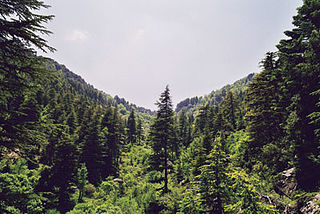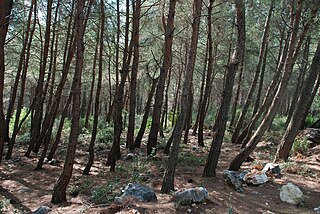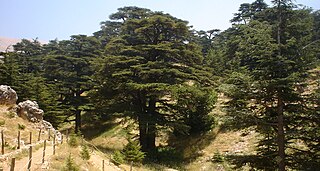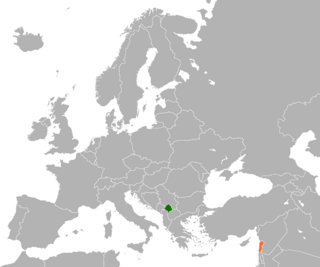Related Research Articles

The Anti-Lebanon mountains are a southwest–northeast-trending, c. 150 kilometres long mountain range that forms most of the border between Syria and Lebanon. The border is largely defined along the crest of the range. Most of the range lies in Syria.

Mount Lebanon is a mountain range in Lebanon. It is about 170 km (110 mi) long and averages above 2,500 m (8,200 ft) in elevation, with its peak at 3,088 m (10,131 ft). The range provides a typical alpine climate year-round.

Cedrus libani, the cedar of Lebanon or Lebanese cedar, is a species of tree in the genus Cedrus, a part of the pine family, native to the mountains of the Eastern Mediterranean basin. It is a large evergreen conifer that has great religious and historical significance in the cultures of the Middle East, and is referenced many times in the literature of ancient civilisations. It is the national emblem of Lebanon and is widely used as an ornamental tree in parks and gardens.

The national flag of Lebanon is formed of two horizontal red stripes enveloping a horizontal white stripe. The white stripe is twice the height (width) of the red ones —a Spanish fess. The green cedar in the middle touches each of the red stripes and its width is one third of the width of the flag. The red stripes represent the blood shed by those who fought for Lebanon. The white stripe represents purity, peace and the snow-capped mountains of Lebanon. The cedar on the flag represents the citizens of Lebanon.
Ash-Shiraa is an Arabic weekly magazine published in Lebanon. The magazine is one of the oldest publications in the country.

Cedrus atlantica, the Atlas cedar, is a species of tree in the pine family Pinaceae, native to the Rif and Atlas Mountains of Morocco, and to the Tell Atlas in Algeria. A majority of the modern sources treat it as a distinct species Cedrus atlantica, but some sources consider it a subspecies of Lebanon cedar.

The Daily Star was an English-language newspaper in Lebanon which was distributed across the Middle East. It was founded by Kamel Mrowa in 1952, ceased its print format in February 2020, and completely closed on 31 October 2021.
Cedar Creek Reservoir is a large reservoir located in Franklin County, Alabama (USA) along Cedar Creek.

Horsh Ehden is a nature reserve located in Northern Lebanon. It contains a forest of the cedar of Lebanon, making it a part of the country's cultural and natural heritage. It is located on the northwestern slopes of Mount Lebanon, the nature reserve experiences high precipitation and is home to numerous rare and endemic plants. Stands of cedars also include a mixed forest of juniper, fir, and the country's last protected community of wild apple trees. In the forest are endangered eastern imperial eagles or Bonelli's eagles, gray wolves, wildcats, golden jackals, and red foxes. Valleys and gorges also have wild orchids, salamanders, mushrooms, and other flora and fauna.

Quercus libani, the Lebanon oak, is a species of oak native to the eastern Mediterranean in western Asia, including in western Syria, northeastern Israel, eastern Turkey, and northern Iraq and Iran. Despite the name, the species is not present in Lebanon.

Forest resources in Syria are in need of study and conservation. The wooded area of the country is variously reported as approximately 190,000 hectares or 450,000 hectares.
Pseudophoxinus libani, also known as the Levantine minnow, is a species of ray-finned fish in the family Cyprinidae. It is the only endemic fish of Lebanon.
Jawbat Burghal is a town in northwestern Syria, administratively part of the Latakia Governorate, located east of Latakia in an-Nusayriyah Mountains. Nearby localities include Qardaha, al-Fakhurah, Istamo and Shatha. According to the Syria Central Bureau of Statistics, Jawbat Burghal had a population of 959 in the 2004 census.
Geranium libani, the Lebanese geranium, is a species of flowering plant in the family Geraniaceae, native to wooded mountains in Lebanon, Syria and central Turkey.

Allium libani is a species of wild bulbous plant geophyte of the genus Allium, belonging to the family of Amaryllidaceae. Allium libani is endemic to the Middle East in Lebanon and Syria.

The Southern Anatolian montane conifer and deciduous forests ecoregion, in the Mediterranean forests, woodlands, and scrub biome, is in the eastern Mediterranean Basin.
Koca Katran Lübnan sediri is a monumental old cedar of Lebanon in Antalya Province, southern Turkey. It is a registered natural monument of the country.
The Çığlıkara Nature Reserve is a forest of mostly Lebanon cedar in Antalya Province, southern Turkey. It is a registered nature reserve of the country.

Kosovar–Lebanese relations are foreign relations between Kosovo and Lebanon. Formal diplomatic relations between two states are non-existent as Lebanon does not recognize Kosovo as a sovereign state.